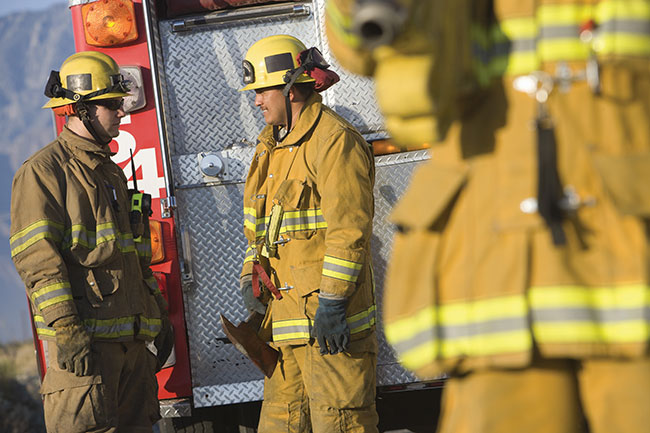
Front Seat: Discussing call performance
Jason Clark
Features Leadership Reviewing the fire fighting response immediately following a call allows for better recall and allows for more open conversations between crew members. PHOTO credit: © Moodboard/Adobe Stock
Reviewing the fire fighting response immediately following a call allows for better recall and allows for more open conversations between crew members. PHOTO credit: © Moodboard/Adobe Stock Watching your team jump off a truck, get to work at a hectic fire scene and bring the situation to a successful outcome is something I really enjoy as a captain. Whether it’s getting a line deployed and at the scene of a fire, forcing a door or extrication operations, team members always want the work unfold relatively smoothly.
Although a well communicated plan can have its snags, we need to be able to review our performance and look at what went well, what didn’t and what we want to change or adjust to allow for future successful operations on the fireground.
I will first begin processing how well a call went on scene as it begins slowing down. Usually, this is when the equipment is getting packed up and trucks start heading back to the hall. More often than not, your team is physically together, helping with the tasks and putting items back to a ready position for the next call.
I firmly believe that the moments right after a scene starts to slow down create some of the best learning opportunities as this allows you to run through your actions as a team and talk about what happened. It’s extremely beneficial for individual firefighters and team leaders as well.
This is especially true in the on-call world of fire fighting, where it there may be a significant amount of time before you work with those same individual firefighters again. So, it would only make sense to use the time while you are all still in the team setting environment to talk it out.
I usually keep it informal —sometimes the conversation with my crew takes place on the back of the bumper of the truck when we are putting gear away or even inside the cab area of the truck on the way back to the station. But, note this conversation does not replace a post incident analysis after a significant incident takes place.
In college, I learned one of the best ways to look at the performance of a team was: “Keep, Stop, Start”. This remains an outline I continue to stick to. It becomes self-explanatory when looking back at the team’s actions and considering what went well, what didn’t go so well and what needs to be eliminated. This is not a finger pointing session or an opportunity for passing the buck or blame around. Instead, it’s an opportunity to become a better team while the events of the call are still fresh in your mind.
For example, we have had motor vehicle collisions that required extrication. After the patient was taken by the paramedics, I would take the opportunity to walk around the scene with the team and discuss what we encountered. This allowed me to better understand what the crew was dealing with through their perspective and gave me the opportunity to learn if there was something I could have done different to assist with the overall objective (i.e. calling for more crews to assist with the task).
Fire fighting is a performance-based job and if we do not perform well, situations won’t be stabilized quickly. We do not get bonuses if we save more property or lives. At the risk of sounding pretentious, we get the satisfaction of knowing that if we did not intervene as emergency responders, things would have continued to get worse.
With the “Keep, Stop, Start” method, there may not even be anything to add to the “Stop” list but, in our line of work, there is always room for improvement and if you and your team ran a really good scene and nothing jumps out at your (like unsafe behaviours or basic skills that weren’t executed correctly), don’t go looking for something to put in that ‘Stop’ category. Take the wins when you can.
As officers, we need to be constantly monitoring our crew’s performance as well as our own. Our basic training is always our foundation of our fire fighting knowledge, but we do require ongoing maintenance and evaluation in order to keep us sharp and focused on our performance. The “Keep, Stop, Start” conversation allows the opportunity to correct mistakes that happen on the fire ground, not by making them personal, but making it about the entire team’s outlook. Most importantly, it also allows us to praise the work that our team accomplished.
Jason Clark has been a volunteer firefighter in southwestern Ontario since 2007. Having recently made the transition to captain from firefighter, Jason has had a new perspective on roles in the fire service and riding in the front seat. jaceclark71@gmail.com or twitter @jacejclark
Print this page